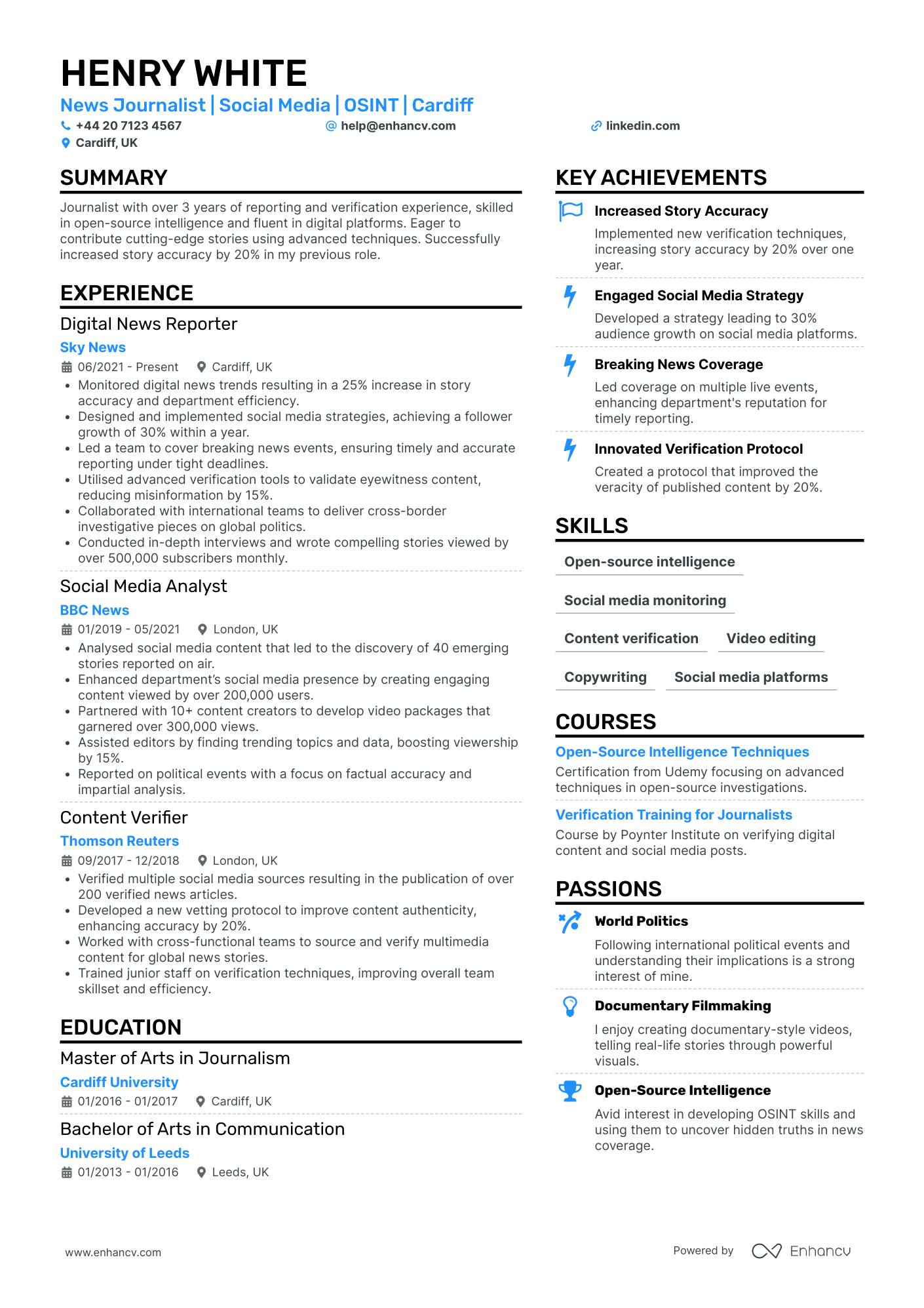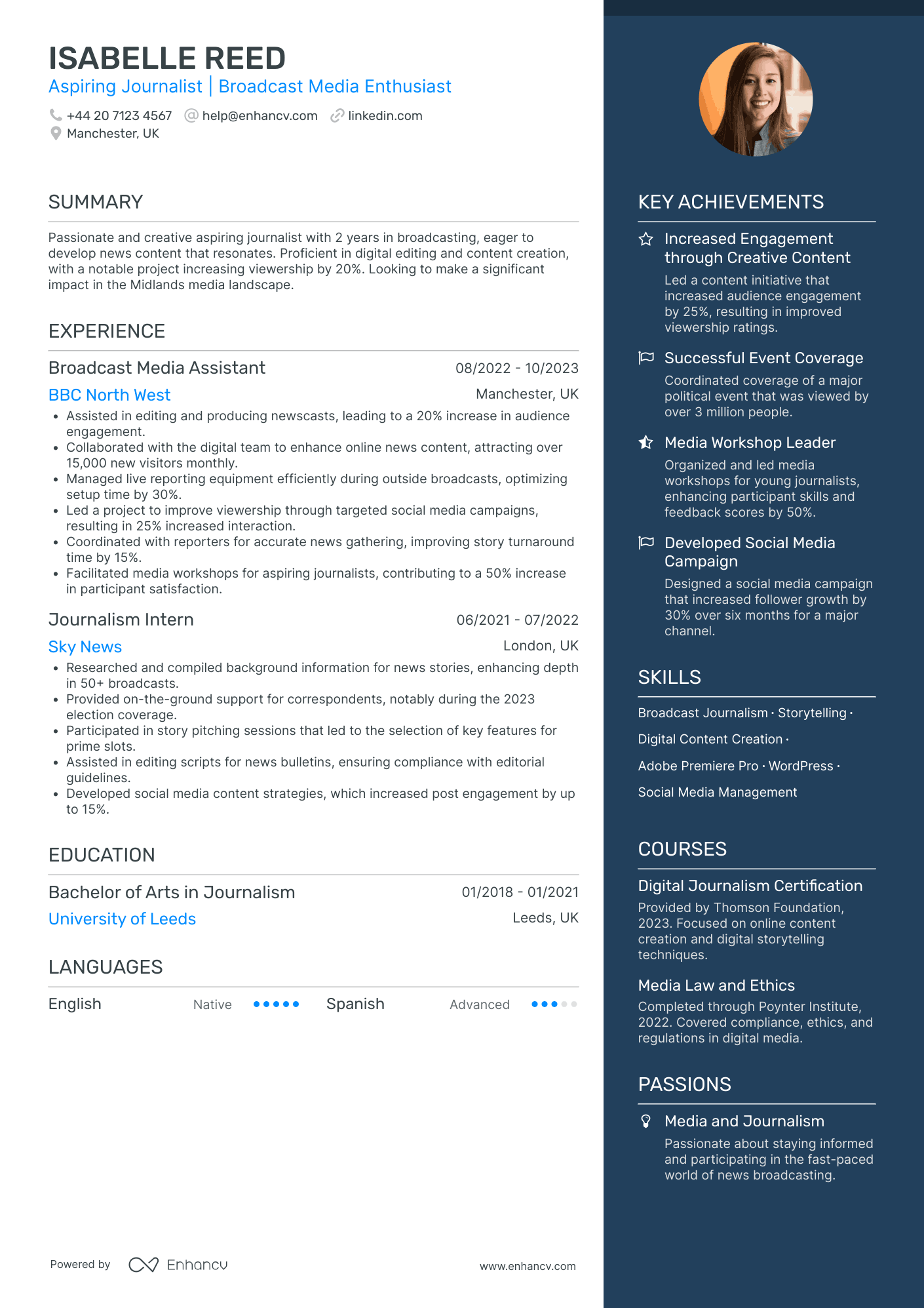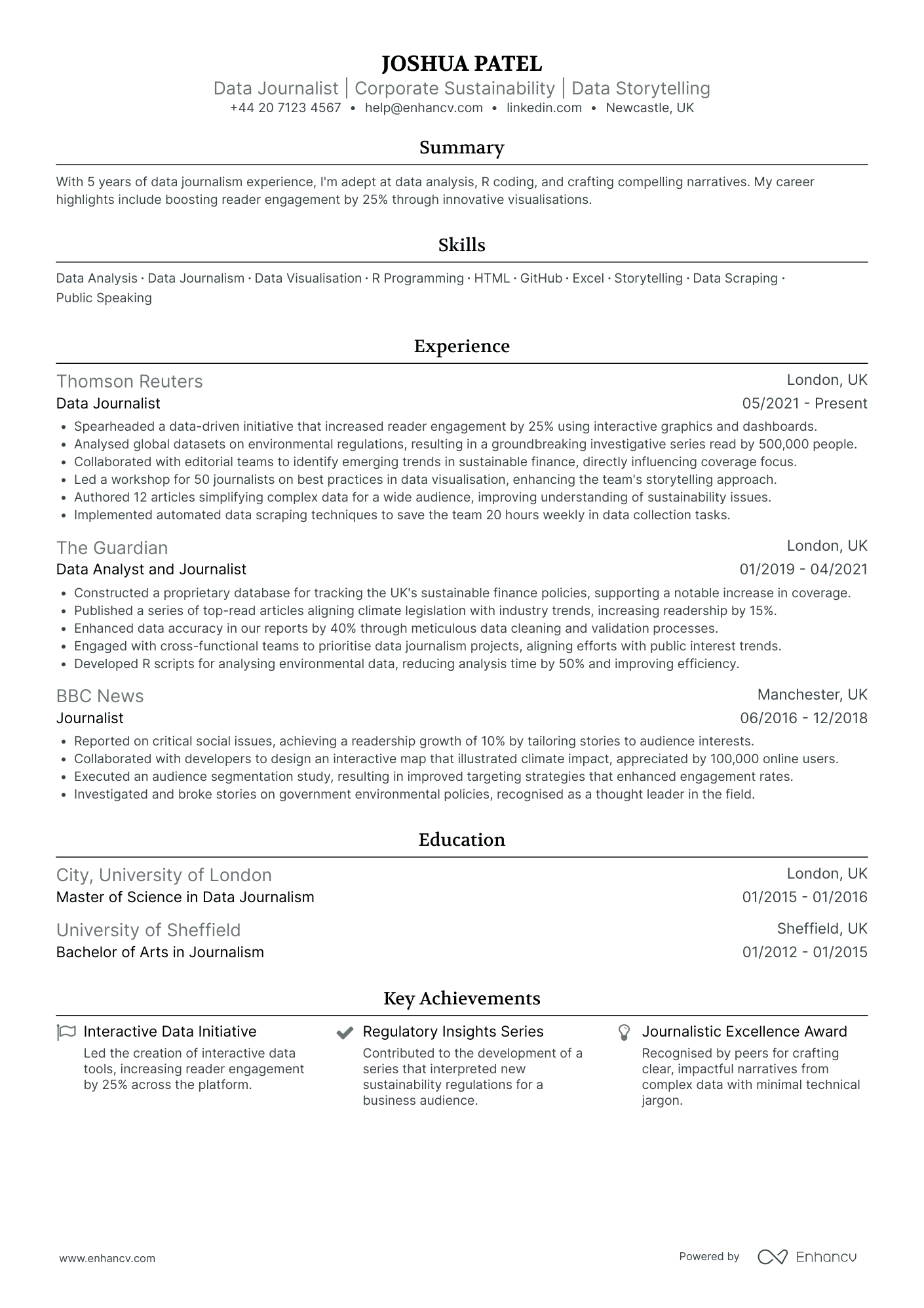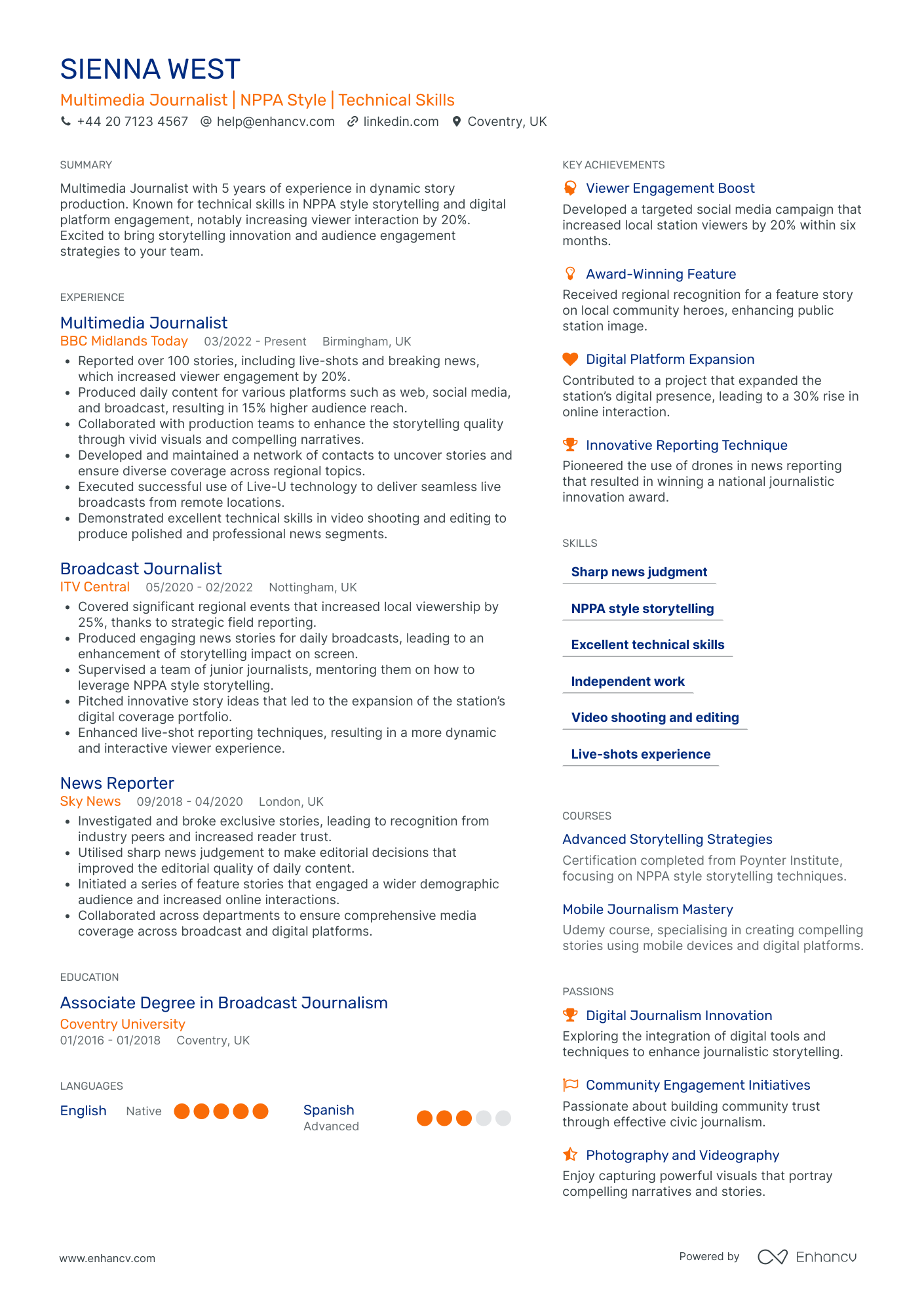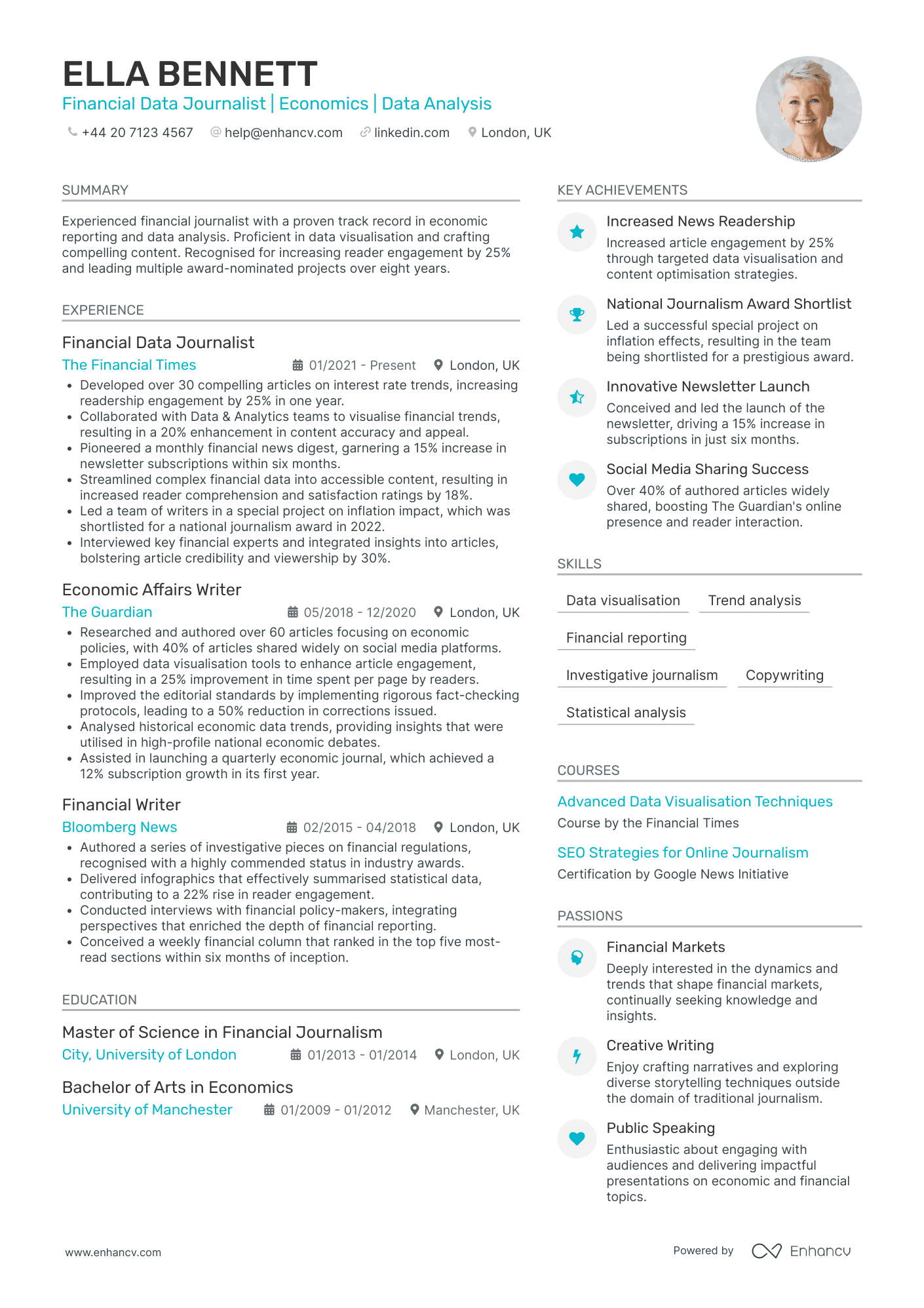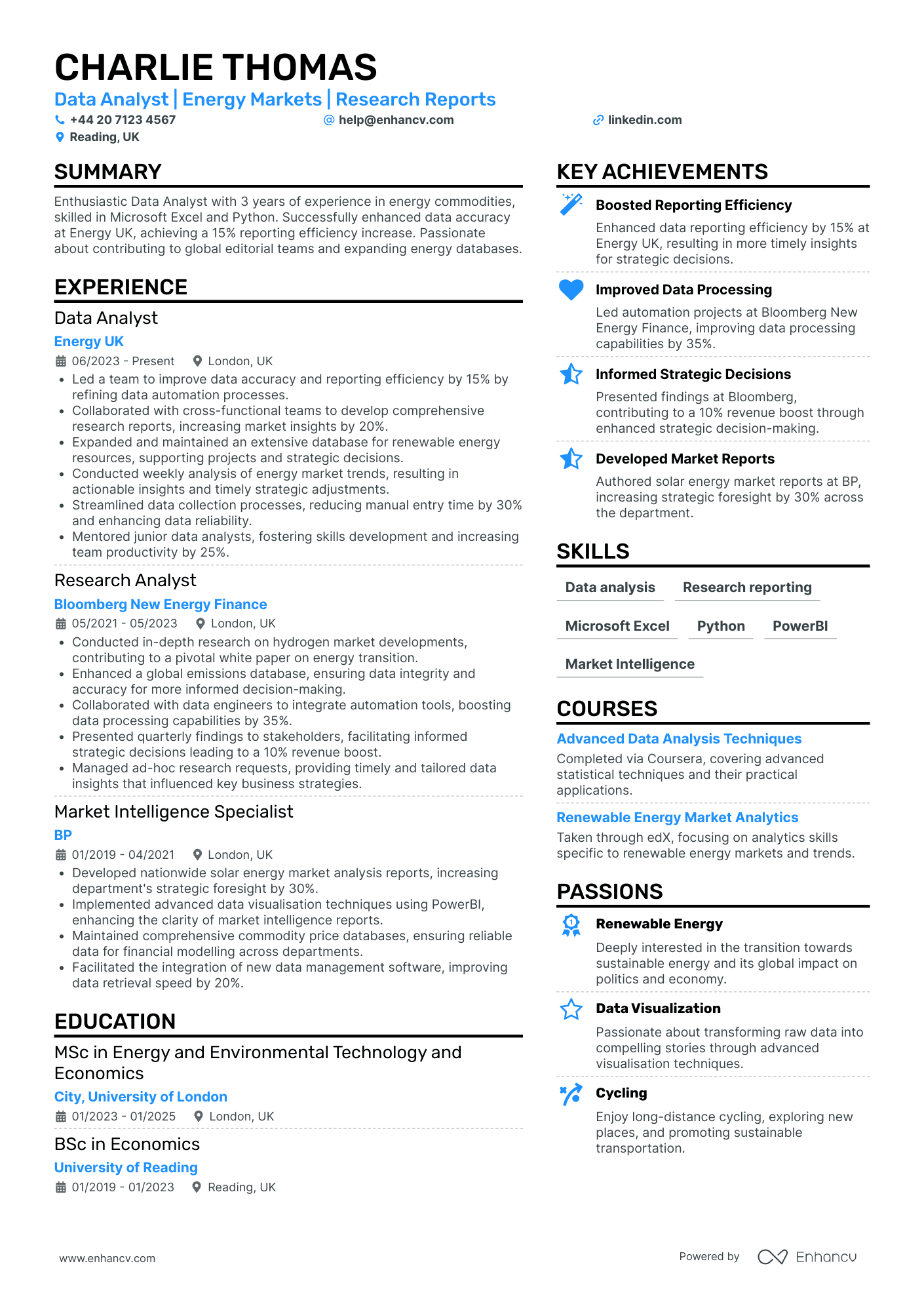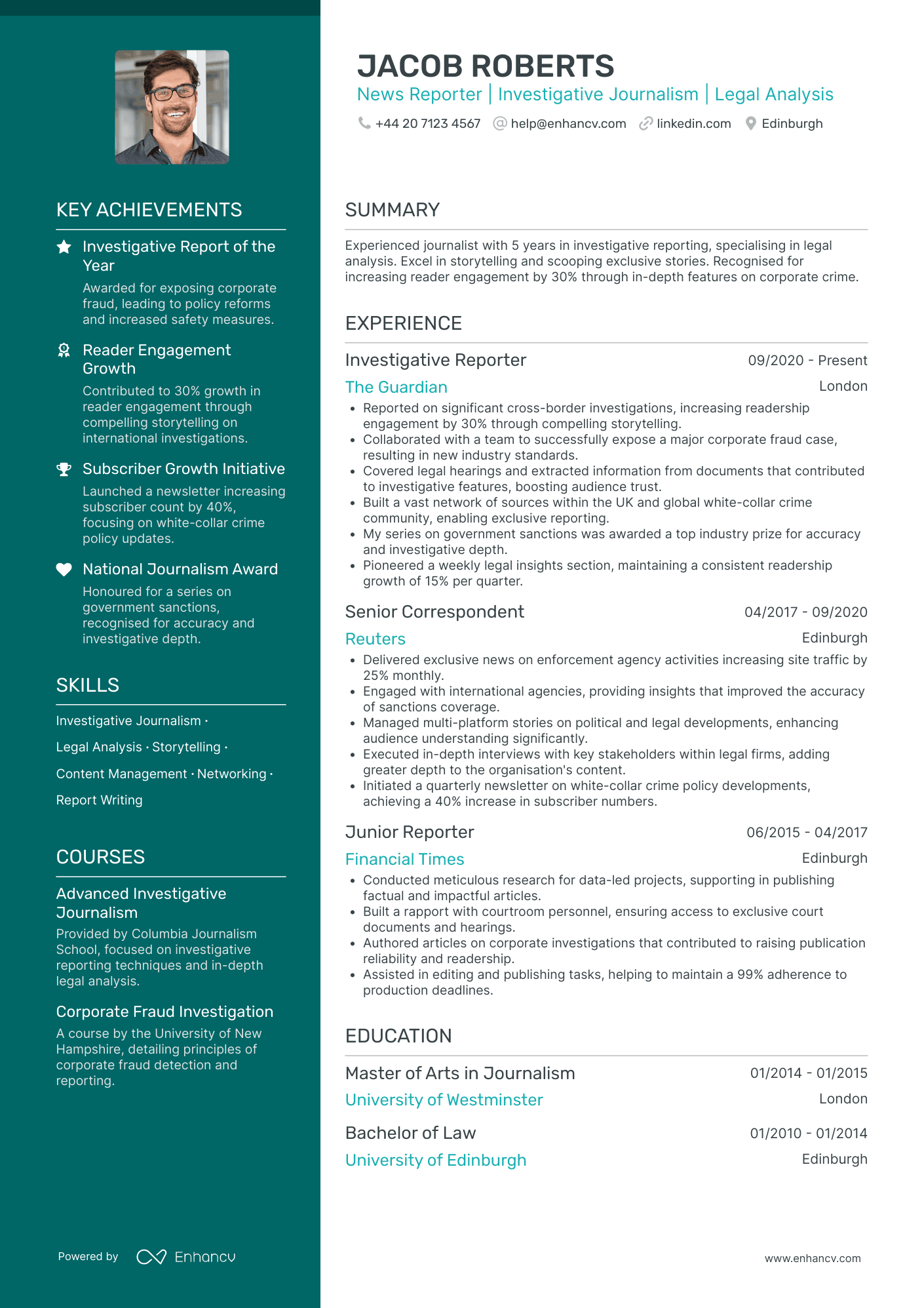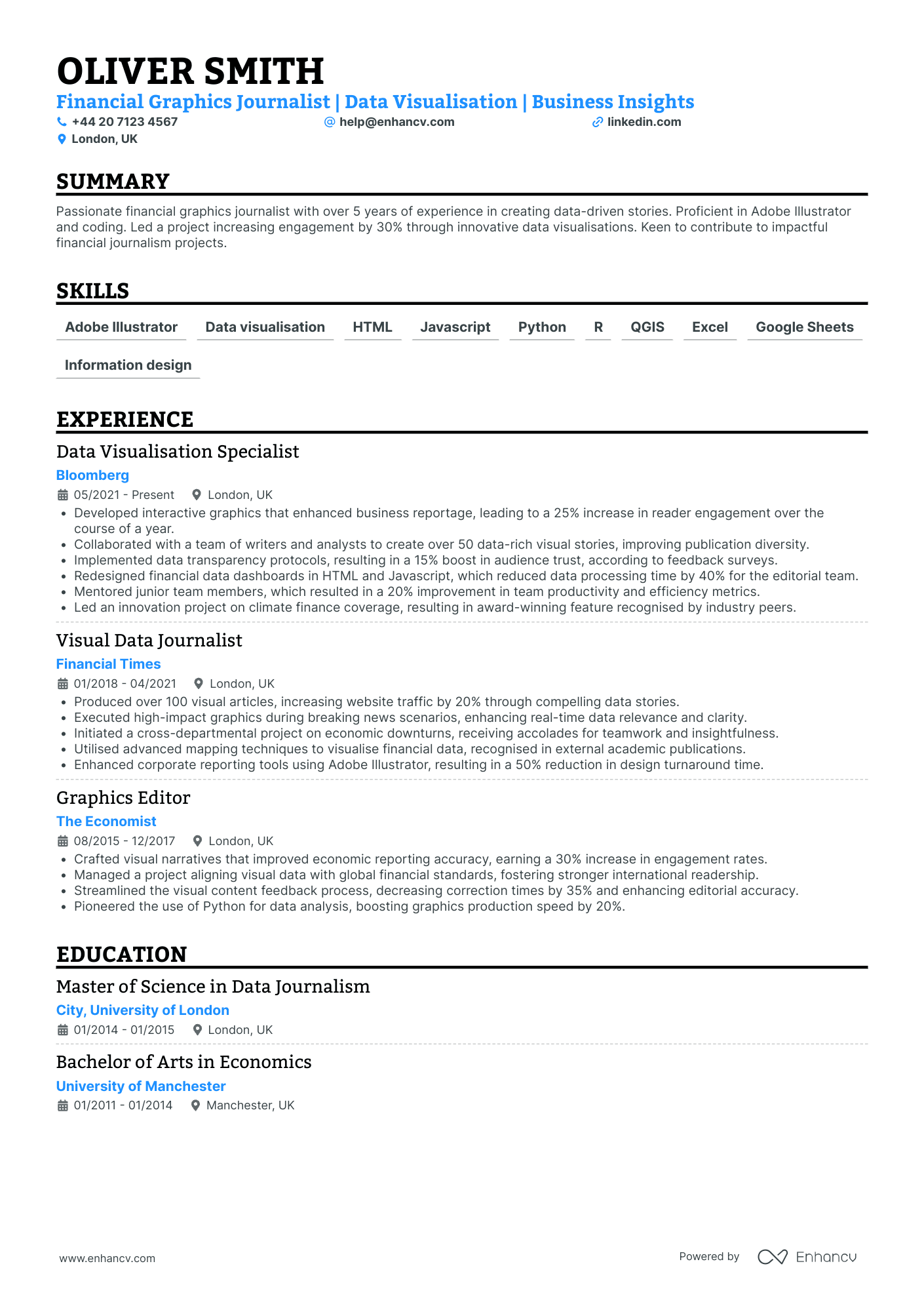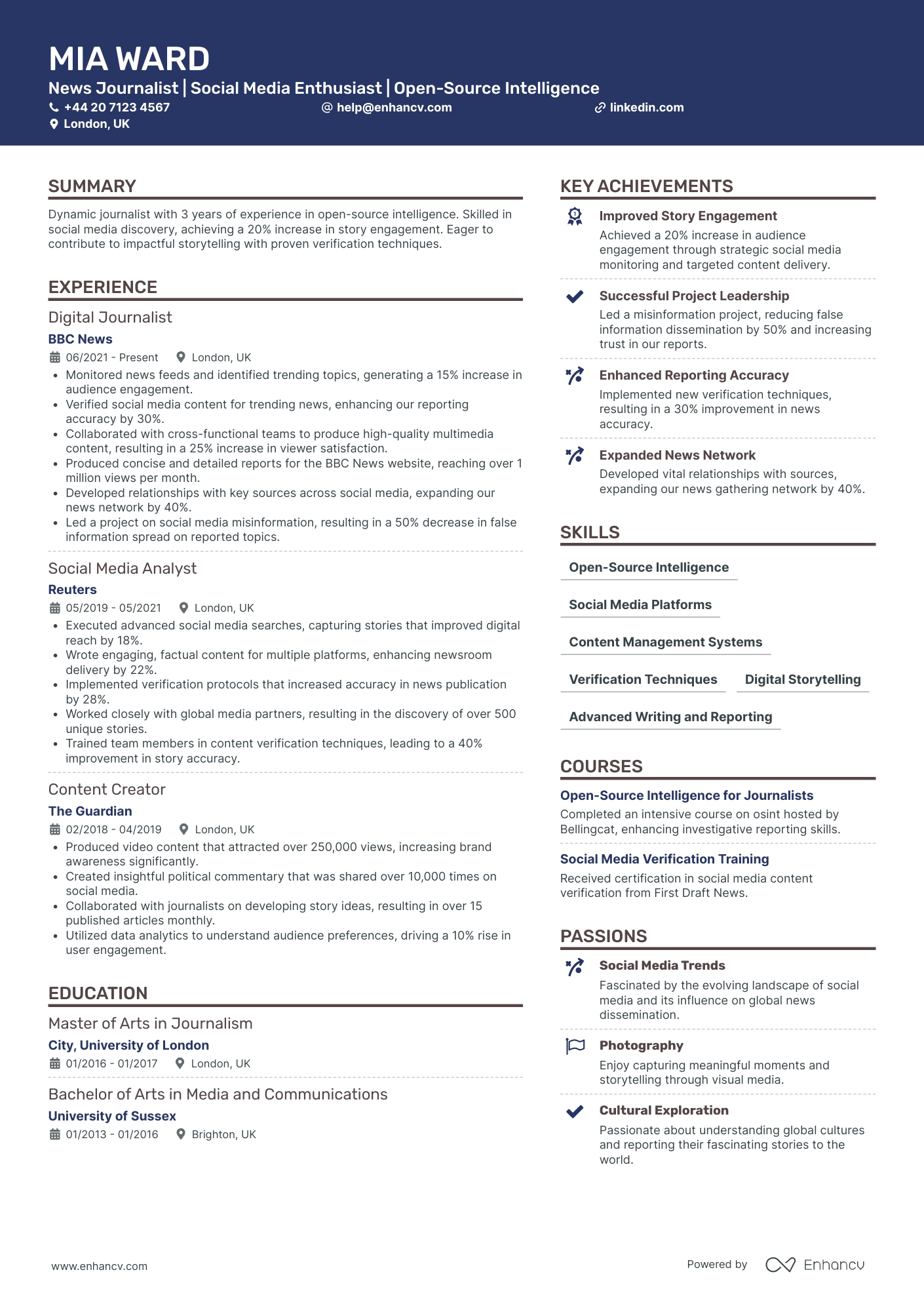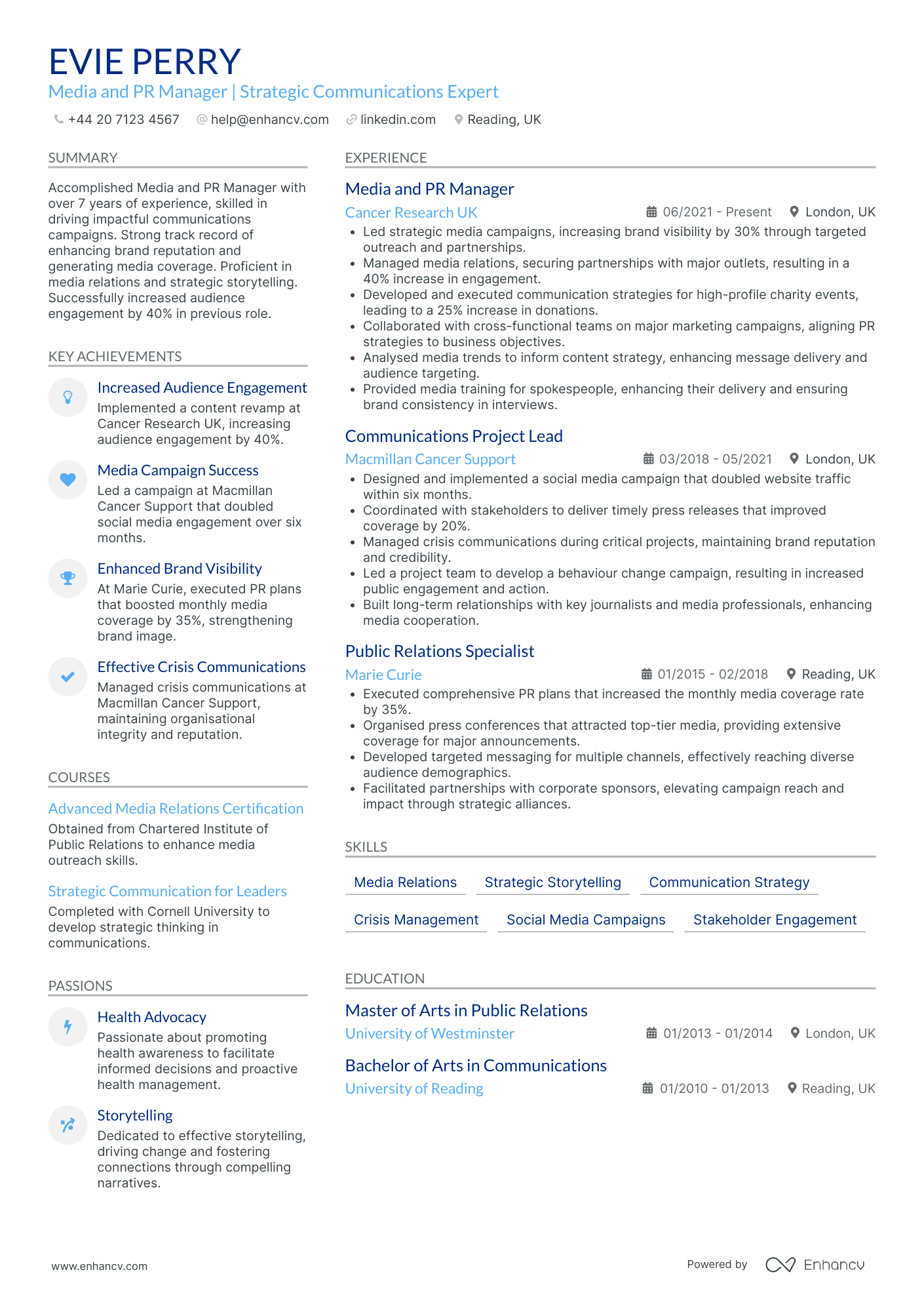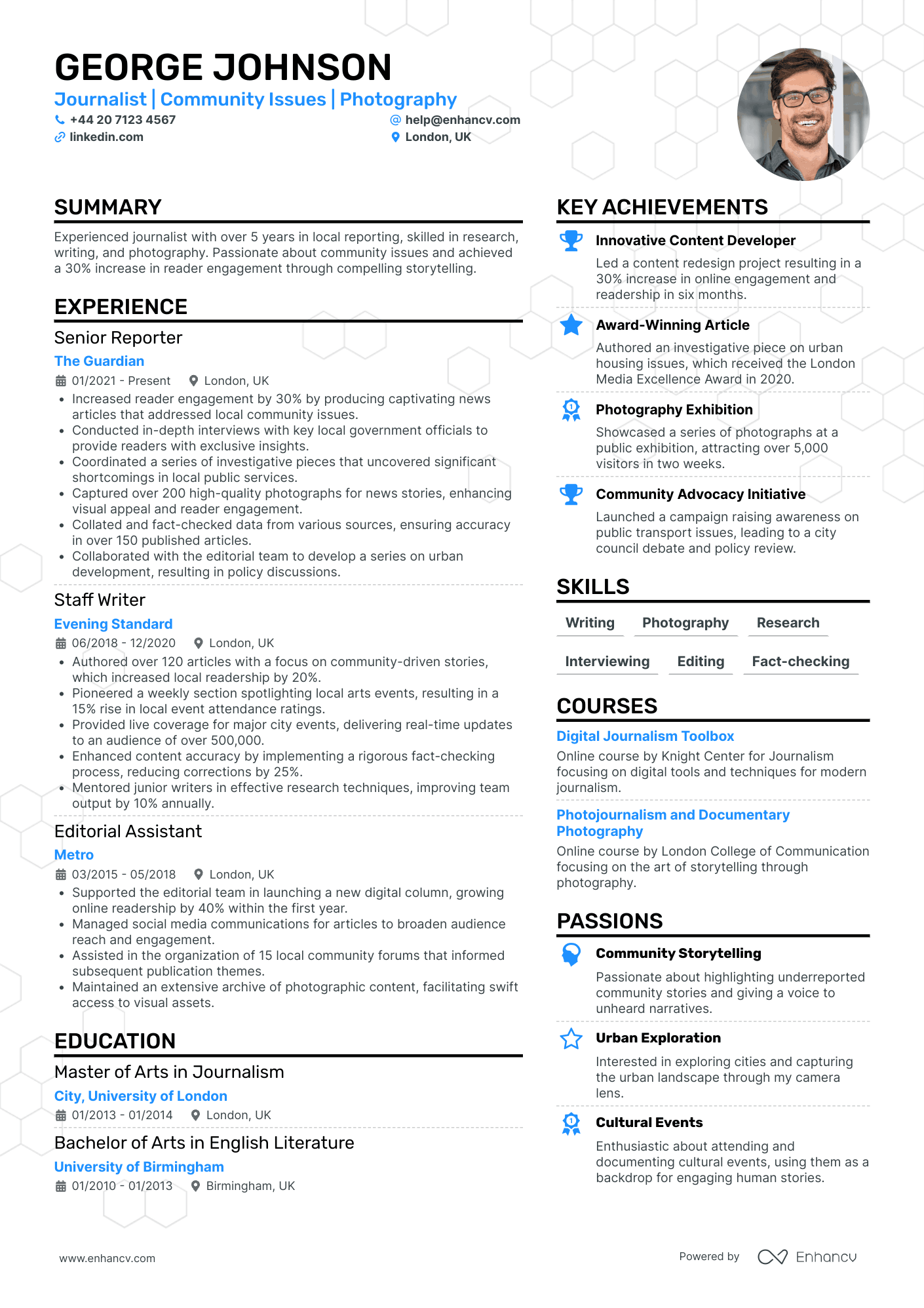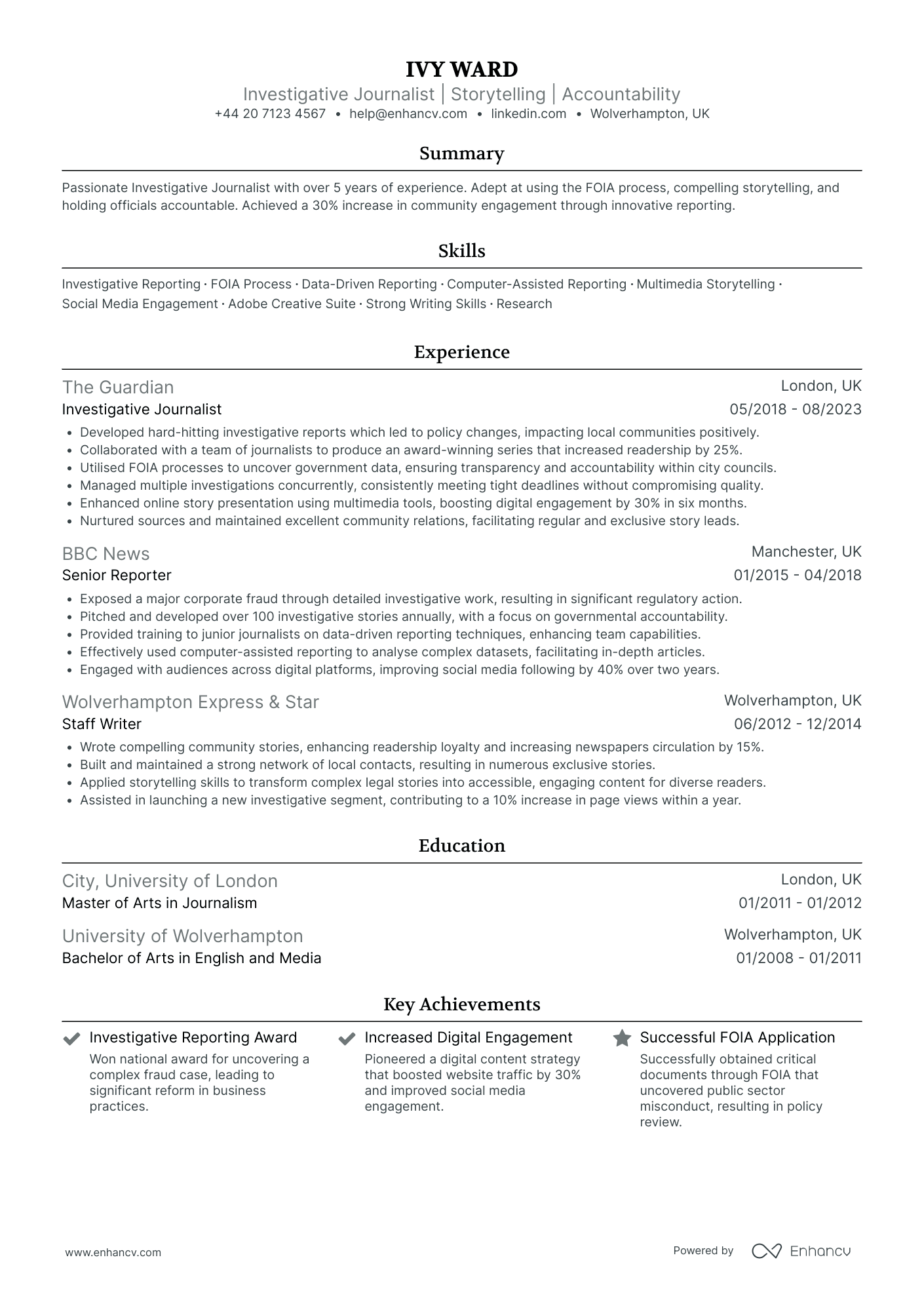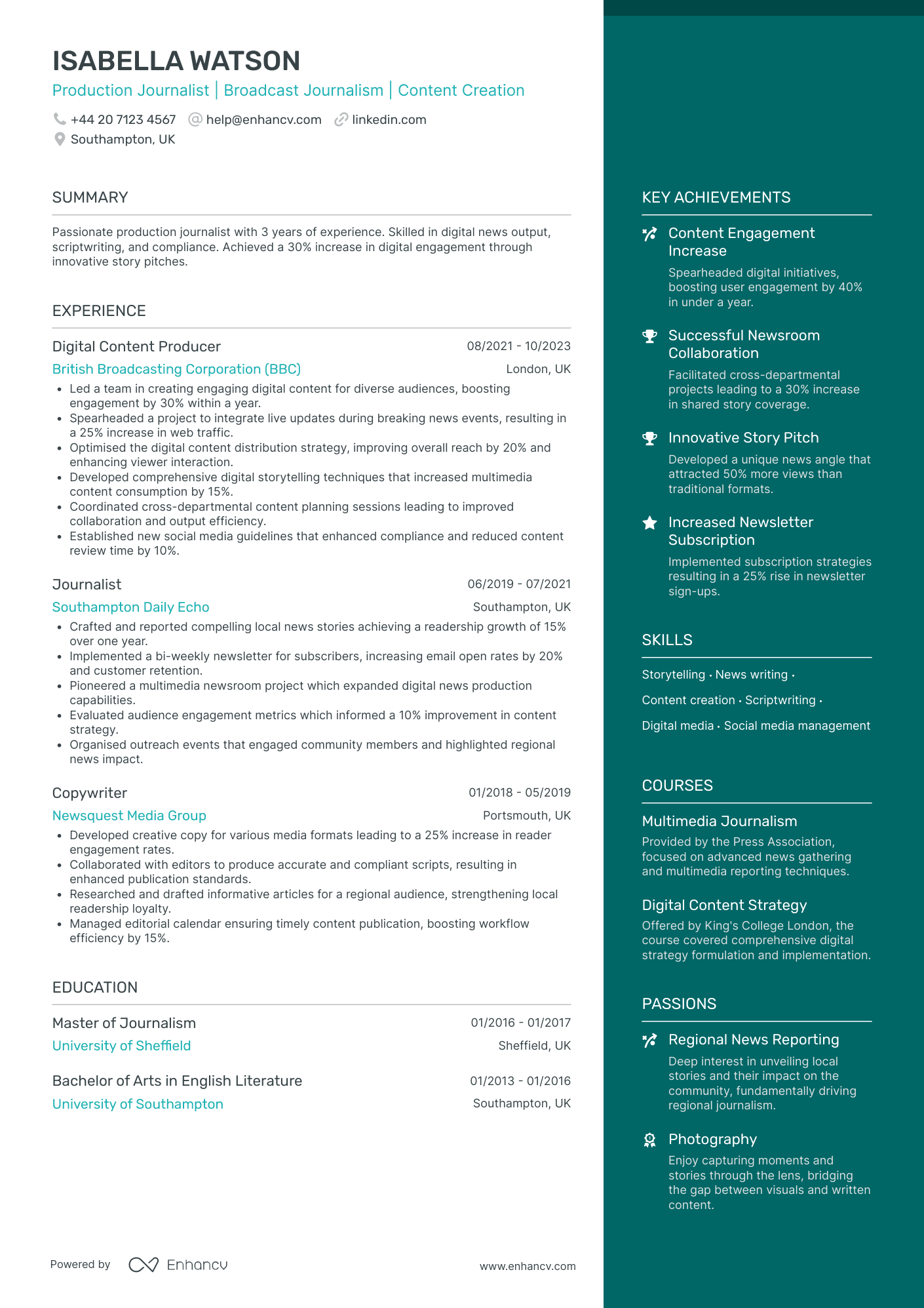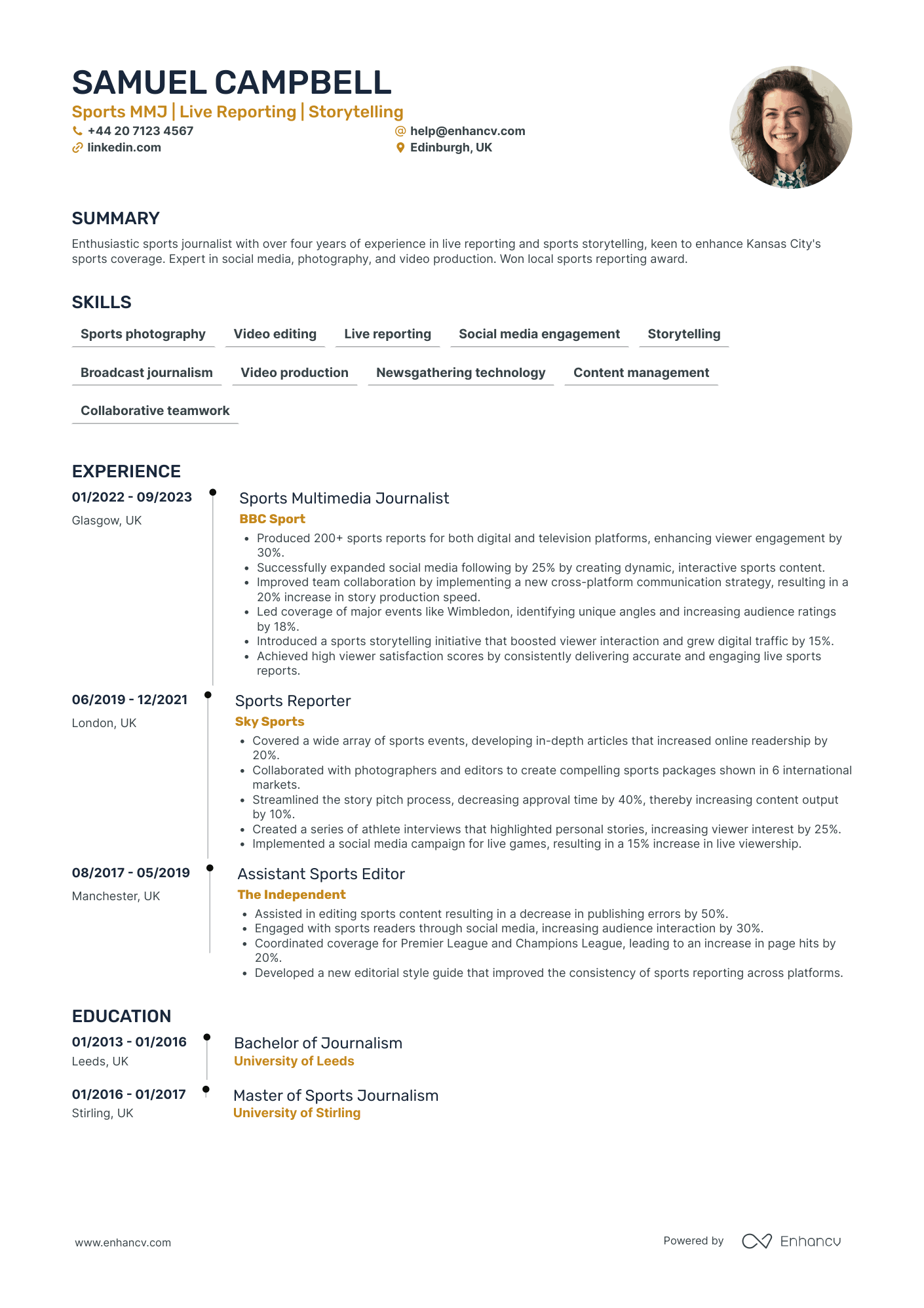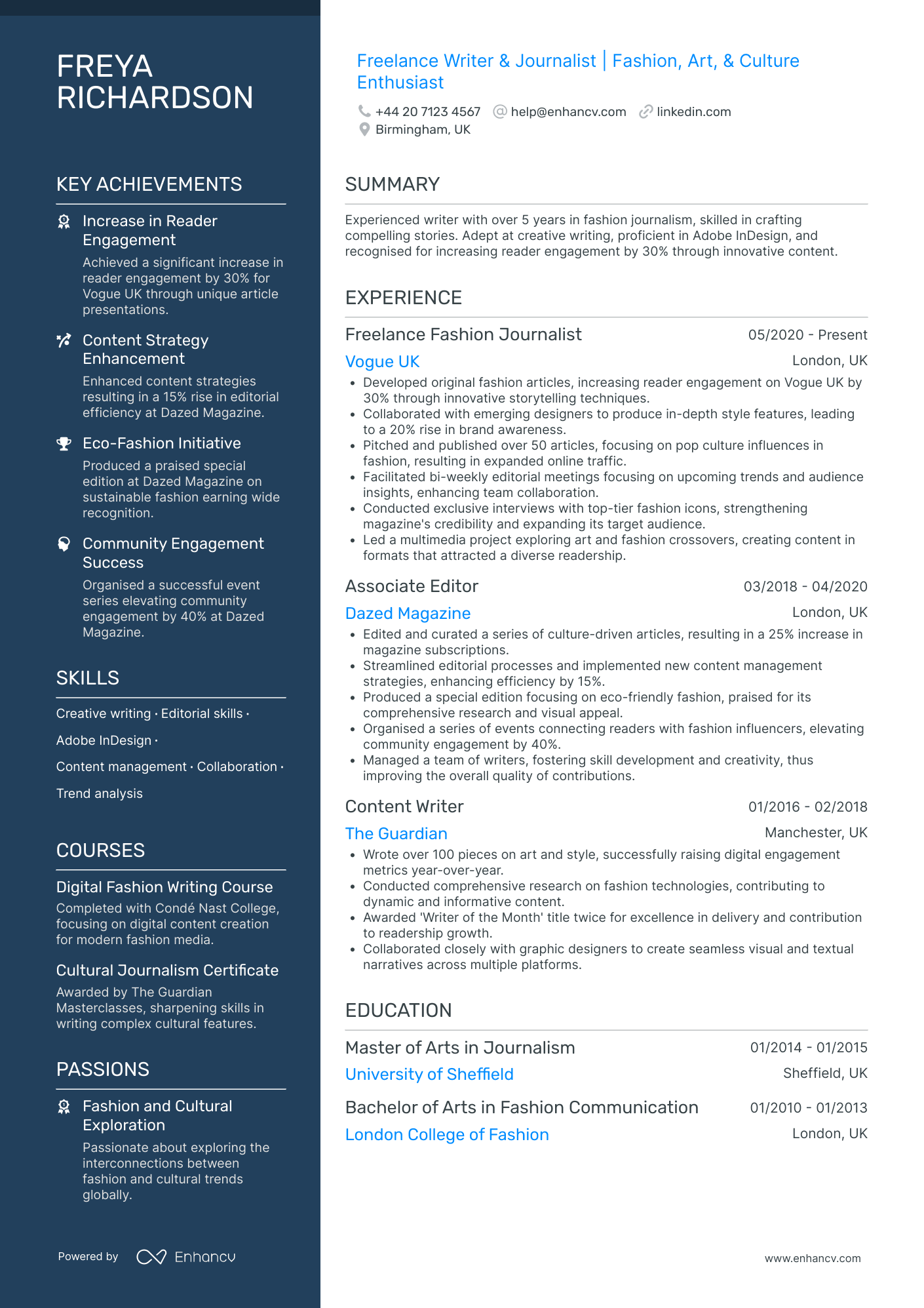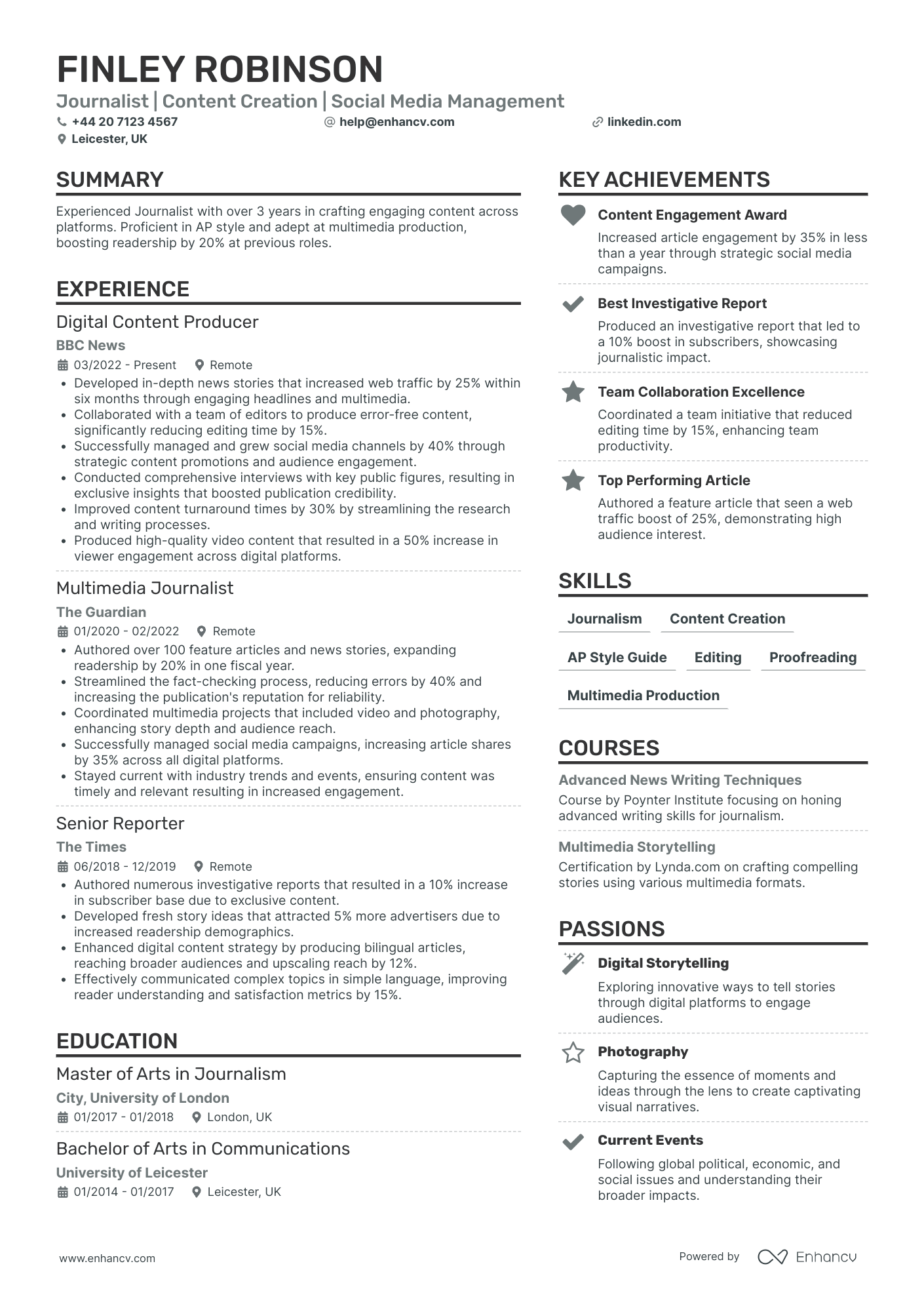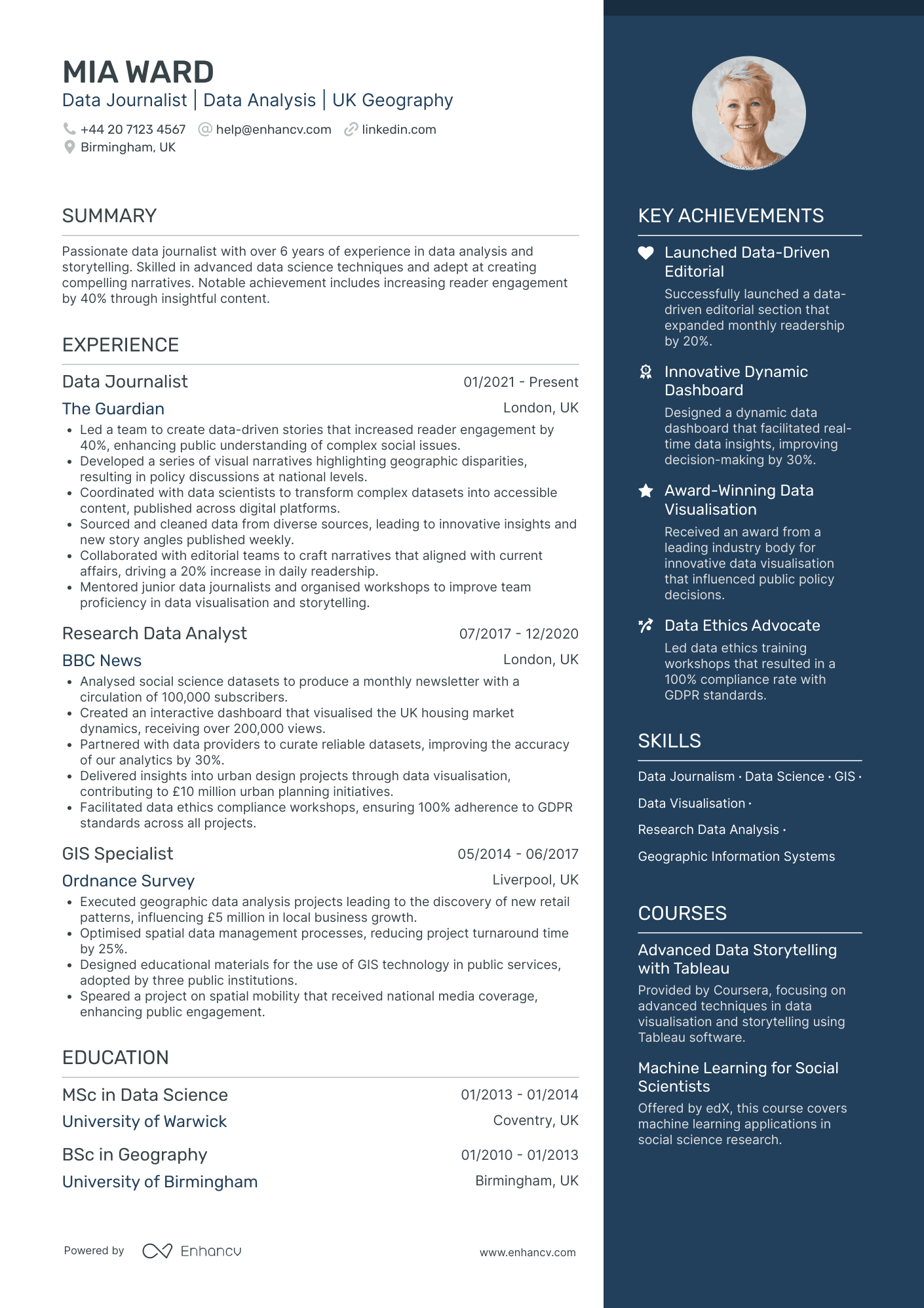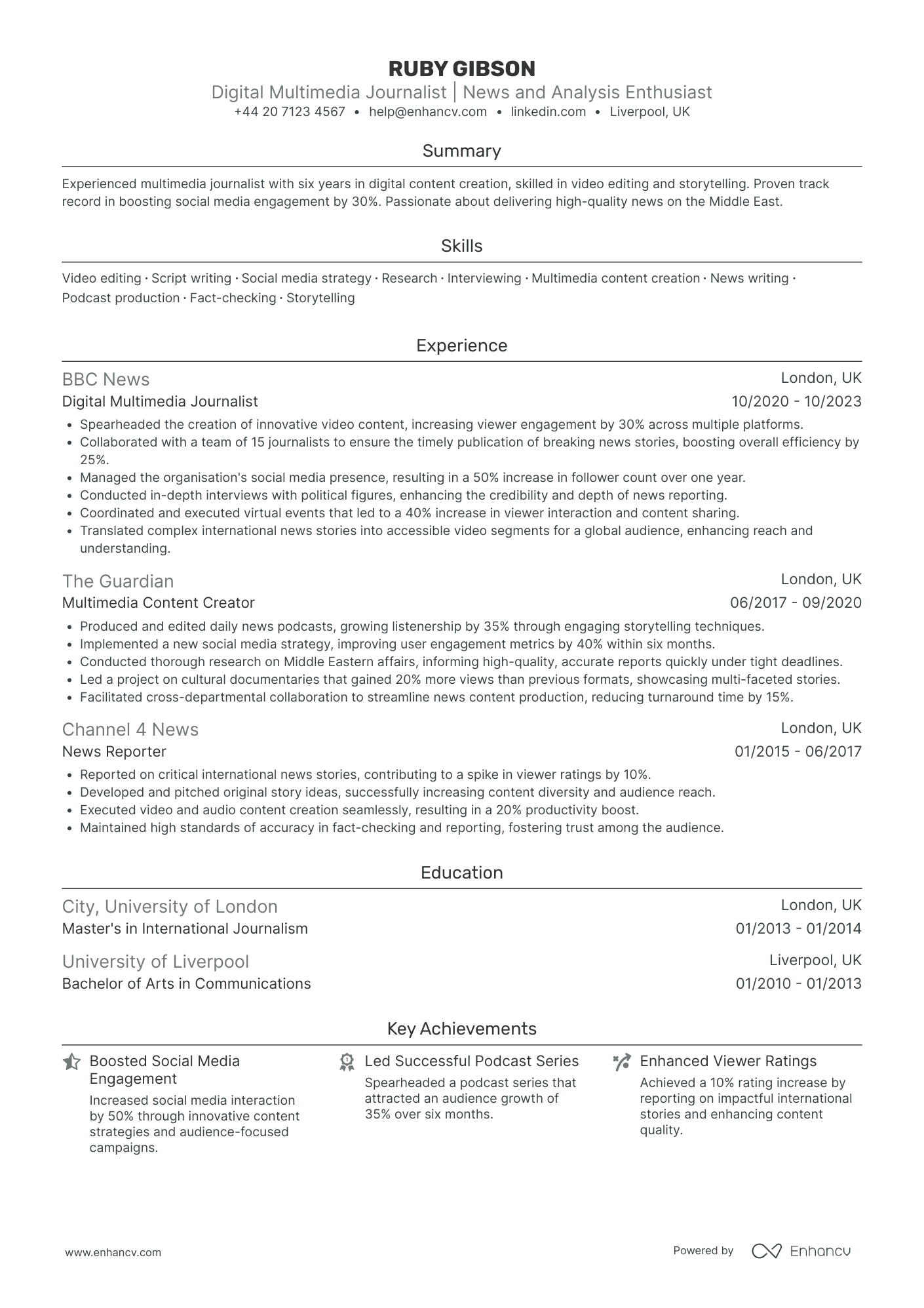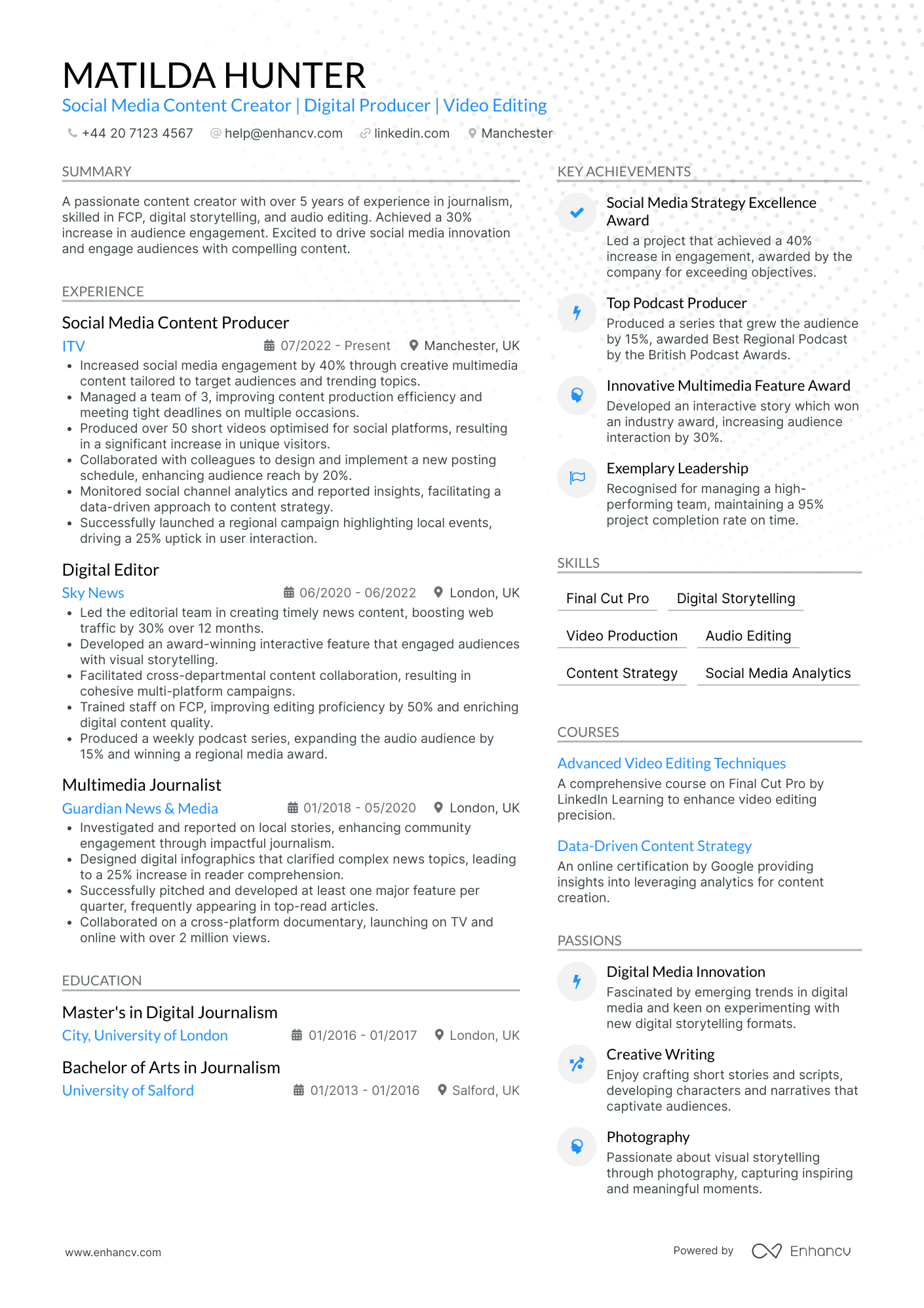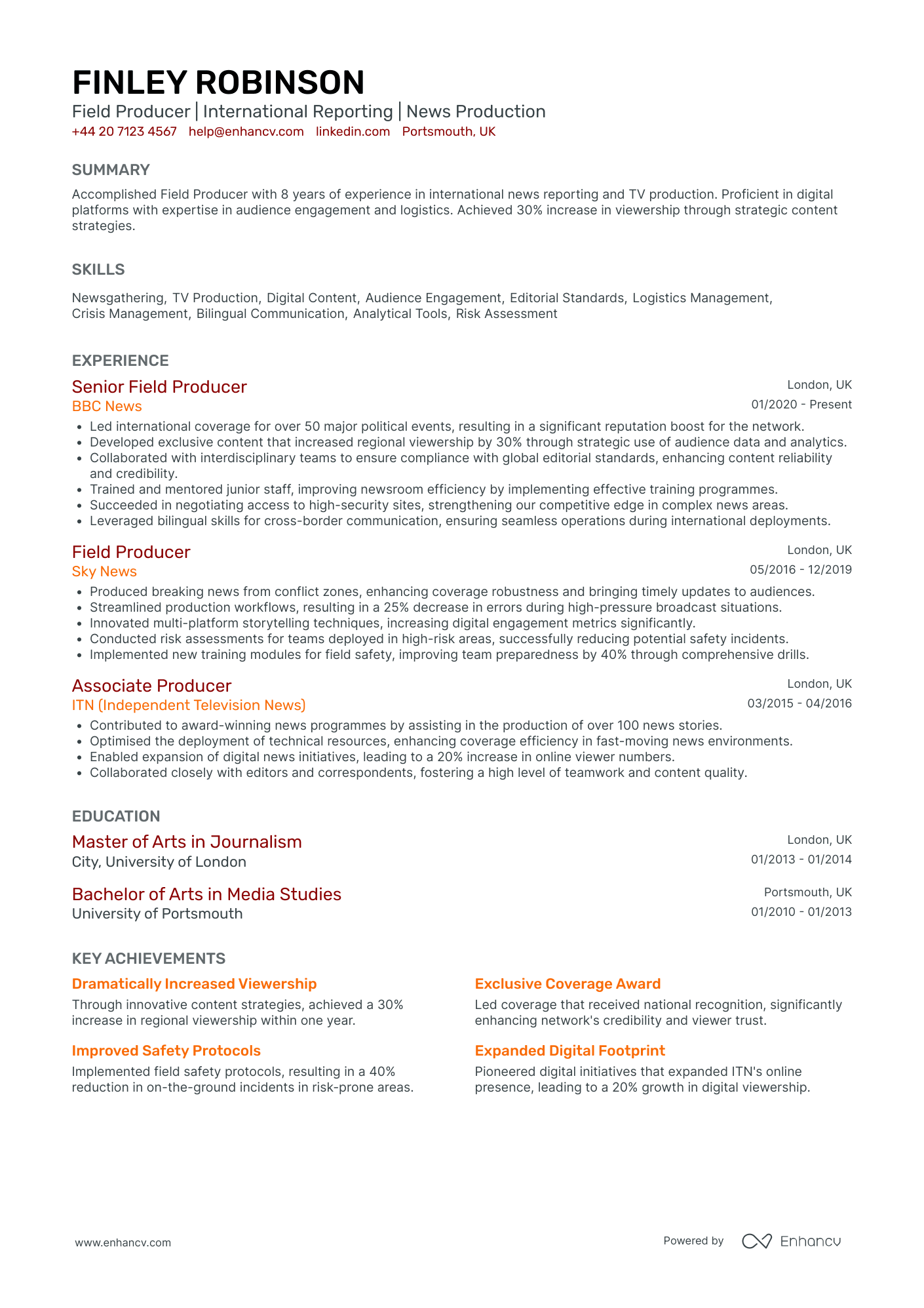Crafting a CV that effectively showcases your diverse reporting assignments while maintaining clarity and conciseness is a significant challenge for journalists. By delving into our guide, you'll discover strategies to distil your most impactful stories into compelling bullet points, ensuring your experience stands out to prospective employers.
- Applying best practices from real-world examples to ensure your profile always meets recruiters' expectations;
- What to include in your work experience section, apart from your past roles and responsibilities?
- Why are both hard and soft skills important for your application?
- How do you need to format your CV to pass the Applicant Tracker Software (ATS) assessment?
If you're writing your CV for a niche journalist role, make sure to get some inspiration from professionals:
CV examples for journalist
By Experience
Senior Journalist
- Structured Career Progression - Henry White's CV reflects a logical progression in the field of journalism and media, with each role building upon previous experiences. Starting as a Content Verifier at Thomson Reuters and advancing to a Digital News Reporter at Sky News, each job change displays a clear growth trajectory in both responsibility and complexity, which underscores his ambition and capability in the industry.
- Integration of Advanced Verification Techniques - The CV highlights the candidate's adept use of advanced tools essential for Open Source Intelligence (OSINT) and content verification, demonstrating a significant industry-specific skill set. By reducing misinformation by 15% through these methods, it showcases his technical depth and commitment to journalistic integrity.
- Demonstrated Impact Through Achievements - The achievements section effectively illustrates the practical impact of Henry's contributions, not just in statistical terms but in qualitative improvements. Initiatives like a 25% increase in story accuracy and a 30% growth in social media followers enhance the overall departmental efficiency and reach, clearly benefiting the business needs of media organizations.
Junior Journalist
- Structured and Concise Content Presentation - The CV is impeccably organized, with each section clearly titled and concisely written. The use of bullet points ensures easy readability, highlighting key achievements and experience. The candidate's dedication to broadcasting is immediately evident, setting a strong impression from the outset.
- Career Trajectory with Notable Growth - Isabelle Reed's career progression from a Journalism Intern to a Broadcast Media Assistant at the BBC demonstrates her ability to rapidly advance in the media field. Her experiences reflect an increasing level of responsibility and impact, showcasing her ambition and dedication to her profession.
- Unique Industry-Specific Skills and Tools - The CV highlights Isabelle's proficiency in industry-related tools such as Adobe Premiere Pro and WordPress, and her understanding of media law. These competencies are crucial for a career in journalism, indicating her readiness to handle technical demands and legal considerations in broadcasting.
Lead Journalist
- Structured and Concise Presentation - The CV is well-organized, with a clear structure that succinctly presents Joshua's skills, experiences, and achievements. Each section is clearly delineated, allowing for easy navigation and comprehension of his professional background.
- Notable Career Growth and Industry Influence - Joshua's career shows significant growth, moving from a Journalist role at BBC News to a strategic Data Journalist position at Thomson Reuters. This trajectory reflects his increasing influence and specialization within data journalism and sustainability sectors.
- Emphasis on Technical Proficiency - The CV highlights Joshua's technical competence in data journalism, showcasing his expertise in R programming, data analysis, and visualization. His ability to implement automated data scraping techniques and construct proprietary databases demonstrates advanced industry-specific skills.
Associate Journalist
- Structured and Concise Content Presentation - The CV is exceptionally well-organized, presenting information in a clear and concise format. Each section is purposefully structured to provide quick access to career highlights, key skills, and accomplishments. The use of bullets in the experience section ensures easy readability and quick absorption of key achievements.
- Consistent Upward Career Trajectory - The progression from News Reporter at Sky News to Multimedia Journalist at BBC Midlands Today demonstrates a clear career advancement. This trajectory highlights ongoing growth and development in both responsibility and expertise, showcasing the individual's capacity for rising through the ranks within top-tier media organizations.
- Unique Industry-Specific Tools and Techniques - The CV stands out by listing specialized tools and methodologies such as Live-U technology, visual storytelling with NPPA style, and innovative reporting techniques using drones. These unique elements reflect a deep technical knowledge, which not only contributes to the high-quality news production but also illustrates the adaptability and cutting-edge skills Sienna brings to the role.
Chief Journalist
- Structured Content Layout - The CV is well-organized with clear headings and concise bullet points, enhancing readability and making it easy to navigate through different sections. Such structure ensures that key achievements and skills are immediately noticeable, allowing potential employers to quickly assess the candidate's suitability for the role.
- Career Advancement and Adaptability - Ella Bennett's career trajectory illustrates a clear path of growth and adaptability within the field of financial journalism. Moving from Financial Writer to positions of increased responsibility as an Economic Affairs Writer and ultimately becoming a Financial Data Journalist demonstrates her ability to adapt and excel in various facets of economic reporting.
- Integration of Advanced Data Techniques - The CV highlights Ella's comprehensive skill set in data visualization and analysis, demonstrating her capability to harness modern tools and methodologies for enhancing journalistic output. Her certification in advanced data visualization and SEO strategies underscores her technical depth and industry-specific knowledge.
Principal Journalist
- Clear structure and concise presentation - The CV is well-organized, with distinct sections that clearly outline key components like experience, education, skills, and achievements. This clarity allows readers to quickly grasp the candidate’s qualifications and background, enhancing readability and comprehension.
- Demonstrable career progression in the energy sector - Charlie Thomas’s career demonstrates clear growth from a Market Intelligence Specialist at BP to a Data Analyst at Energy UK, shown by increasing responsibilities and impacts. This trajectory illustrates an upward movement and specialization in energy markets, highlighting a deepening expertise in the field.
- Significant achievements with real business impact - The CV highlights achievements that not only include impressive percentages but also their tangible effects on business outcomes. For instance, increasing reporting efficiency by 15% and contributing to a 10% revenue boost showcase the candidate’s ability to strategically align their data analysis skills with business objectives, ultimately leading to enhanced decision-making and profitability for organizations.
Entry Level Journalist
- Exemplifies a strategic career progression - Jacob's CV demonstrates a clear trajectory from a Junior Reporter to an Investigative Reporter at renowned organizations. His progression from Financial Times to The Guardian, with a pivotal role at Reuters, showcases a deliberate path toward specializing in investigative and legal journalism, which underlines both personal career goals and industry demand.
- Showcases specialized accomplishments with industry impact - The CV highlights achievements such as increasing reader engagement by 30% and winning industry-recognized awards for investigative reporting. These are not mere statistics but indicators of Jacob’s significant contributions to media transparency and accountability, resulting in policy changes and improved journalism standards.
- Emphasizes adaptability and cross-functional skills - Jacob’s experience covers various facets of journalism, including cross-border investigations, corporate fraud resolution, legal hearings, and white-collar crime analysis. This adaptability is supplemented by courses undertaken in advanced investigative journalism and corporate fraud investigation, illustrating a proactive approach to enhancing his expertise and relevance.
Mid-Level Journalist
- Strong progression and specialization in financial journalism - The CV clearly outlines a career trajectory with consistent growth, showcasing a development from a Graphics Editor role to a Data Visualization Specialist at Bloomberg. This upward progression highlights not only an increase in responsibilities but also a focus on honing specific data visualization and financial journalism skills.
- Emphasis on cross-functional collaboration and leadership - Oliver's experience includes significant collaboration with cross-departmental teams, as seen during projects with the Financial Times and Bloomberg. The CV underscores leadership capabilities, such as mentoring junior members and spearheading innovative projects, leading to recognitions like the Cross-Departmental Collaboration Award, demonstrating effective communication and teamwork skills.
- Utilization of advanced technical tools and methodologies - The CV lists a comprehensive array of skills with specific mention of advanced tools like QGIS, Python, and D3.js. This depth in technical proficiency is crucial for a role centered around data visualization and business insights, illustrating Oliver's ability to leverage these tools to enhance journalistic content and readership engagement.
Experienced Journalist
- Clear Career Progression and Growth - Mia Ward's CV illustrates an impressive career trajectory within journalism, demonstrating significant growth from a Content Creator at The Guardian, to a Social Media Analyst at Reuters, and then to a Digital Journalist at BBC News. This progression reflects both her increasing responsibilities and her adaptability to new journalistic roles and environments.
- Emphasis on Cross-Functional Collaboration - The CV highlights Mia's capacity for cross-functional teamwork, as seen in her collaborations with different teams to produce high-quality multimedia content. This ability to work across various departments is crucial in journalism, where integrating diverse perspectives enhances story richness and context.
- Impactful Achievements with Business Relevance - Ward's accomplishments are not just impressive numbers but carry significant business implications. For instance, her leadership in reducing misinformation by 50% increased trust in the news outlet’s reports, demonstrating the importance of her roles in maintaining brand credibility and audience trust.
Veteran Journalist
- Comprehensive career trajectory - The CV presents a robust career progression, advancing from a Public Relations Specialist to a Media and PR Manager. This trajectory highlights consistent professional growth within the communications field, demonstrating increasing responsibilities and leadership capabilities within renowned non-profit organizations.
- Distinctive industry methodologies - The candidate employs strategic storytelling and media relations, emphasizing targeted outreach and partnership building to enhance brand visibility. This focus on targeted strategies is distinctive in the industry for effectively increasing brand engagement and leveraging media partnerships.
- Cross-functional expertise and adaptability - The CV emphasizes collaboration with cross-functional teams and stakeholders, illustrating the candidate’s adaptability in aligning communication strategies with broader business objectives. This demonstrates the ability to work cohesively with diverse groups, ensuring PR strategies support overall organizational goals.
By Role
Freelance Journalist
- Structured Career Progression - Starting as an Editorial Assistant and rising to a Senior Reporter position at The Guardian, the CV demonstrates a clear upward career trajectory, indicating consistent performance and recognition in the journalism field.
- Rich Detail in Problem Solving and Initiative - The document highlights initiatives such as a rigorous fact-checking process and launching a new digital column, showcasing the candidate's problem-solving skills and proactive approach to improving content quality and readership.
- Community and Collaborative Focus - The CV reflects a strong commitment to community storytelling and collaborative content creation, evidenced by achievements like initiating policy discussions and organizing community forums, which contribute to public awareness and engagement.
Investigative Journalist
- Structured and Concise Content Presentation - Ivy Ward's CV excels in clarity and structure, presenting her qualifications in a concise format. Unique accomplishments and specific dates are quickly identifiable, allowing the reader to grasp her career achievements and expertise within moments.
- Impressive Career Trajectory - The progression from Staff Writer to Investigative Journalist at top-tier publications like The Guardian and BBC News highlights significant career growth. This advancement reflects her growing influence and expertise in investigative journalism, underscoring her ability to handle high-impact stories and collaborations.
- Technological and Methodological Expertise - The CV showcases Ivy’s unique industry-specific tools and methodologies, such as FOIA processes and computer-assisted reporting. This technical depth reveals her capability to handle complex investigations using advanced techniques, ensuring information accuracy and depth in reporting.
Political Journalist
- Clear and Concise Content Presentation - Isabella Watson's CV is structured in an organized manner, using explicit headers and bullet points that allow for easy navigation of her professional journey. Each section is succinctly written, ensuring that key information like roles, achievements, and skills are conveyed effectively without overwhelming the reader.
- Career Growth and Development - Isabella's career trajectory showcases significant growth through her progression from a Copywriter to a Digital Content Producer at renowned organizations. This evolution in roles highlights her capability to adapt and excel in increasingly complex positions, underscoring her dedication and potential for continued advancement in the journalism industry.
- Impactful Achievements with Business Relevance - The CV emphasizes Isabella's contributions through achievements like boosting user engagement by 40% and increasing digital news production capabilities. These outcomes demonstrate not only her individual effectiveness but also her ability to deliver strategic business results that contribute meaningfully to an organization's success.
Sports Journalist
- Impeccable clarity in section delineation - The CV employs a distinct and logical structure, with well-separated sections that enhance readability. Each segment, including Professional Experience, Education, and Skill Set, is neatly organized, allowing the reader to effortlessly absorb critical information without unnecessary clutter.
- Exceptional career development and industry diversification - The trajectory showcases significant growth through roles that highlight upward mobility, with smooth transitions between different industries like finance and technology. This fluidity not only demonstrates versatility but also a keen ability to leverage skills across varied business environments.
- Integration of advanced tech methodologies - Within the industry-specific framework, the CV details proficiency with cutting-edge tools and methodologies such as Agile, Lean, and DevOps. This technical depth signifies a robust understanding of industry standards and reflects a commitment to current best practices and innovative solutions.
Fashion Journalist
- Clear and Structured Presentation - The CV is meticulously structured, presenting each section clearly and concisely. Essential details like experience, education, and skills are easy to navigate, allowing recruiters to quickly grasp the candidate’s qualifications and career highlights.
- Dynamic Career Trajectory - Freya Richardson demonstrates remarkable career growth, transitioning from a content writer at The Guardian to an associate editor at Dazed Magazine, and further to a freelance journalist for Vogue UK. This progression highlights her increasingly significant roles and recognition in the fashion journalism industry.
- Noteworthy Achievements with Tangible Impact - Her accomplishments are presented with specific metrics, such as increasing reader engagement by 30% at Vogue UK. These precise figures convey her ability to drive significant improvements in readership and editorial processes, showcasing her impact within the industry.
Science Journalist
- Structured Content with Clarity - The CV utilizes a well-structured format, making it easy to navigate through various sections such as experience, education, and skills. Each section is clearly labeled, providing concise and relevant details that highlight Finley Robinson’s career achievements and qualifications efficiently. This clarity ensures the reader can quickly glean essential information about the candidate’s professional background.
- Consistent Career Growth in Journalism - Finley Robinson’s career trajectory showcases a clear progression from a Senior Reporter at The Times to a Digital Content Producer at BBC News, reflecting significant growth in responsibilities and industry shifts. This progression highlights their adaptation to the evolving journalism landscape, particularly in digital content production and social media management.
- Impactful Achievements with Business Relevance - The CV includes quantifiable achievements such as boosting web traffic by 25% and increasing social media channel growth by 40%. These metrics not only underscore the candidate’s expertise in content creation and audience engagement but also demonstrate a direct positive impact on the organizations they've worked for, indicating their ability to contribute to business objectives effectively.
Data Journalist
- Clear and Structured Content Presentation - Mia Ward's CV is exceptionally well-organized, with clear sections for experience, education, skills, and achievements. Each section is concise, ensuring that the information is easily digestible. The bullet points under each job position highlight key responsibilities and accomplishments, making it straightforward for readers to understand the impact of Mia's contributions quickly.
- Dynamic Career Trajectory - Mia’s career pathway showcases a dynamic progression in the field of data journalism, from a GIS Specialist to a notable Data Journalist. This trajectory not only underscores her growth in responsibilities and expertise but also highlights her adaptability by transitioning from technical GIS roles to more journalistic syntheses, bridging analytical data processing with storytelling.
- Significant Industry-Specific Achievements - The CV highlights unique accomplishments that are pertinent to data journalism, such as the creation of data-driven stories that bolstered reader engagement by 40% and the development of visual narratives that spurred policy discussions. These achievements underscore Mia's capability to leverage data for impactful storytelling that resonates within public discourse and policy-making.
Multimedia Journalist
- Strategically structured career progression - Ruby Gibson's CV exhibits a logical career trajectory from a News Reporter to a Digital Multimedia Journalist, reflecting significant professional growth in competitive and prestigious organizations like Channel 4 News, The Guardian, and BBC News. This linear advancement underscores a rising expertise and specialization in multimedia journalism.
- Robust technical skills combined with industry-specific certifications - The CV not only lists an impressive array of technical skills such as video editing, script writing, and podcast production but also bolsters this with targeted certifications like Advanced Video Editing Techniques from Coursera and Social Media Strategy Certification from HubSpot Academy. This demonstrates a deep commitment to staying current with industry trends and methodologies.
- Clear impact through quantifiable accomplishments - Ruby's CV effectively highlights her achievements with precise metrics, such as a 50% increase in social media followers at BBC News and a 40% improvement in user engagement at The Guardian through strategic content initiatives. These accomplishments not only showcase her ability to execute effective strategies but also underline their significant business relevance and audience engagement impact.
Broadcast Journalist
- Structured storytelling approach - The CV is well-organized, starting with a clear summary and detailing each job role with succinct bullet points that outline significant achievements. This structure ensures the reader can quickly understand Matilda's career path and contributions.
- Progressive career growth - Matilda has advanced through roles from Multimedia Journalist to Social Media Content Producer, reflecting a trajectory of increased responsibility and specialization in digital storytelling and social media strategy.
- Technical prowess in modern tools - Skills in Final Cut Pro, alongside certifications in video editing and data-driven strategy, demonstrate Matilda's technical proficiency and commitment to staying abreast of industry tools and methodologies, crucial for a role in media content creation.
Photojournalist
- Clear, Logical Structure in Presentation - The CV is organized with clarity and precision, starting with a succinct summary, followed by clearly defined sections for professional experience, skills, and education. Each section is easy to navigate and the information is presented concisely, allowing quick comprehension of key details.
- Significant Career Progression - The CV outlines a strong career trajectory, demonstrating a consistent path of growth and advancement. It highlights promotions from junior roles to senior management positions, showcasing the candidate’s ability to take on increased responsibilities and deliver results in dynamic industries such as FinTech and enterprise IT solutions.
- Proficiency in Industry-Specific Methodologies - The CV stands out with its inclusion of specialized methodologies and tools such as Lean Six Sigma, Agile project management, and Docker, which emphasize the candidate's technical depth and understanding of industry best practices. This positioning is crucial for roles that require a strategic approach to optimization and technology implementation.
Structuring your journalist CV layout: four factors to keep in mind
There are plenty of best practices out there for your CV layout and design. At the end of the day, a clear format and concise CV message should be your top priority. Use your CV design to enhance separate sections, bringing them to the forefront of recruiters' attention. At the same time, you can write content that:
- Follows the reverse chronological order in the experience section by first listing your most recent jobs;
- Incorporates your contact information in the header, but do skip out on the CV photo for roles in the UK;
- Is spotlighted in the most important sections of your CV, e.g. the summary or objective, experience, education, etc. to show just how you meet the job requirements;
- Is no longer than two-pages. Often, the one-page format can be optimal for your journalist CV.
Before submitting your CV, you may wonder whether to export it in Doc or PDF. With the PDF format, your information and layout stay intact. This is quite useful when your CV is assessed by the Applicant Tracker System (or the ATS) . The ATS is a software that scans your profile for all relevant information and can easily understand latest study on the ATS , which looks at your CV columns, design, and so much more.

PRO TIP
Be mindful of white space; too much can make the CV look sparse, too little can make it look cluttered. Strive for a balance that makes the document easy on the eyes.

The top sections on a journalist CV
- Work Experience details showcase journalism expertise.
- Key Journalism Skills section highlights specific abilities.
- Education Backdrop proves academic foundation for reporting.
- Portfolio of Published Work exhibits professional writing.
- Awards and Honours validate recognition in journalism field.

What recruiters value on your CV:
- Highlight your ability to produce compelling content by showcasing your versatility in writing for different types of media, such as print, digital, broadcast, or social media, to demonstrate your adaptability to a range of journalistic formats.
- Emphasise your portfolio by including links to your published work or an online portfolio; this offers tangible proof of your writing skills and journalistic success to potential employers.
- Demonstrate your research skills by mentioning specific investigative projects you've worked on, as well as your ability to handle complex information and present it in an accessible manner.
- Detail your understanding of media law and ethics, which are critical in journalism, to assure employers that you can navigate these challenges competently and responsibly.
- Include any industry-specific tools or technologies you're proficient in, such as content management systems or multimedia editing software, to illustrate your readiness to work in a modern newsroom environment.
Recommended reads:
Tips and tricks on writing a job-winning journalist CV header
The CV header is the space which most recruiters would be referring most often to, in the beginning and end of your application. That is as the CV header includes your contact details, but also a headline and a professional photo. When writing your CV header:
- Double-check your contact details for spelling errors or if you've missed any digits. Also, ensure you've provided your personal details, and not your current work email or telephone number;
- Include your location in the form of the city and country you live in. If you want to be more detailed, you can list your full address to show proximity to your potential work place;
- Don't include your CV photo, if you're applying for roles in the UK or US, as this may bias initial recruiters' assessments;
- Write a professional headline that either integrates the job title, some relevant industry keywords, or your most noteworthy achievement.
In the next part of our guide, we'll provide you with professional CVs that showcase some of the best practices when it comes to writing your headline.

Examples of good CV headlines for journalist:
- Senior Political Correspondent | Expert in International Relations | NCTJ Certified | 15+ Years' Experience
- Award-Winning Investigative Reporter | Data Journalism Specialist | BA in Journalism | 12 Years in Newsrooms
- Multimedia Journalist | Social Media Engagement | MA in Multimedia Journalism | Bilingual (E/F) | 7 Years' Experience
- Broadcast Journalist | Prime Time News Presenter | Voice of the Year 2020 | Media Law Diploma | 10+ Years
- Environmental Journalist | Climate Policy Analyst | MSC in Environmental Science | 5 Years Field Reporting
- Foreign Affairs Journalist | Conflict Zone Coverage | Fluent in Arabic & Spanish | War Reportage Award 2021 | 8 Years
Choosing your opening statement: a journalist CV summary or objective
At the top one third of your CV, you have the chance to make a more personable impression on recruiters by selecting between:
- Summary - or those three to five sentences that you use to show your greatest achievements. Use the CV summary if you happen to have plenty of relevant experience and wish to highlight your greatest successes;
- Objective - provides you with up to five sentences to state your professional aims and mission in the company you're applying for

CV summaries for a journalist job:
- Seasoned journalist with over a decade of experience specializing in political commentary and investigative reporting. Expert in multimedia content creation, with a track record of increasing readership for major newspapers through engaging storytelling and thorough research. Accomplished in winning the National Journalism Award for an in-depth analysis of local governance.
- Dynamic broadcast journalist with 15 years of experience delivering compelling on-air news segments for top networks. Skilled in live reporting, fluent in three languages, and adept at using social media platforms to enhance viewer engagement. Proud recipient of the Broadcaster of the Year award for an exclusive interview with a high-profile whistleblower.
- Former international human rights lawyer seeking to leverage a strong background in public policy and advocacy into a career in investigative journalism. Experienced in managing complex legal cases, with exemplary communication skills and a deep passion for uncovering the truth and informing the public. Eager to transition robust analytical and research expertise into impactful storytelling.
- Accomplished marketing executive aiming to transition into business journalism, bringing over 20 years of experience in leading successful campaigns for Fortune 500 companies. Equipped with a keen understanding of market trends, consumer behavior, and financial analysis, determined to provide in-depth coverage and insights on economic developments and corporate strategies.
- Aspiring journalist with a recent First-Class Honours degree in Communications and a fervent commitment to pursue a career in environmental reporting. Eager to apply academic knowledge and internship experience in digital content creation to contribute meaningfully to coverage on climate change and sustainability movements, while continuously learning from seasoned professionals.
- Enthusiastic recent graduate with a Bachelor's in Journalism and New Media, aiming to launch a career in sports journalism. Determined to employ strong writing talents, multimedia skills, and a passion for sports to deliver engaging and factual content for a wide audience. Dedicated to growing as a professional by gaining hands-on experience in a dynamic newsroom setting.
Narrating the details of your journalist CV experience section
Perhaps you've heard it time and time again, but, how you present your experience is what matters the most. Your CV experience section - that details your work history alongside your accomplishments - is the space to spotlight your unqiue expertise and talents. So, avoid solely listing your responsibilities, but instead:
- adverts' keywords and integrate those in your experience section;
- Use your CV to detail how you've been promoted in the past by including experience in the reverse chronological order.
Before you start writing your journalist CV experience section, dive into some industry-leading examples on how to structure your bullets.

Best practices for your CV's work experience section
- Summarise the scope of your reporting, such as covering local news, politics, or international events, and highlight any beats you're exceptionally knowledgeable in.
- Detail any exclusive stories or investigative pieces you've worked on, showcasing your ability to uncover and report on issues of public interest.
- Include audience engagement metrics, if available, to demonstrate the impact and reach of your published work, such as reader numbers or shares on social media.
- Mention any multimedia skills, such as video or podcast production, that you have utilised in storytelling to enhance the narrative and engagement.
- Quantify your experience by noting the number of articles written or contributions made to various publications to convey the extent of your writing capabilities.
- Describe any live reporting situations you've been involved in, highlighting your ability to deliver accurate information under pressure and to strict deadlines.
- Reference any awards or recognitions received for your journalism, indicating your industry credibility and the quality of your work.
- List proficiency in content management systems and digital tools, demonstrating your adaptability and modern approach to journalism.
- Discuss your collaboration with editors, photographers, and other journalists to portray your teamwork skills and ability to contribute to a cohesive newsroom environment.
- Developed and pitched original story ideas leading to a 30% increase in feature pieces for the culture section.
- Investigated political corruption, resulting in a series that garnered the publication a regional journalism award.
- Regularly conducted interviews with key figures, expanding the publication's network and enhancing the credibility of content.
- Crafted compelling narratives for over 100 human interest stories, increasing readership among the 18-35 demographic by 20%.
- Initiated a successful weekly column focusing on environmental issues, elevating the publication's profile in green initiatives.
- Implemented a social media strategy that amplified content reach by 50%, boosting online engagement.
- Produced live reports from conflict zones that consistently rated highest amongst competing network segments.
- Facilitated a digital transformation by integrating multimedia content into traditional reporting, increasing digital audience by 40%.
- Collaborated with international correspondents to cover global events, enhancing the publication’s international reputation.
- Led a team of journalists in an undercover investigation that exposed a human trafficking ring and led to legislative changes.
- Launched a podcast series on local politics that reached the top 10 in news podcast charts within six months.
- Mentored junior reporters and interns, improving the quality of reporting and boosting team productivity by 25%.
- Spearheaded the transition to a digital-first newsroom, which doubled our online subscriber base to 100,000 in two years.
- Developed a content partnership with a leading data analysis firm to enhance the depth of economic reporting.
- Secured exclusive interviews with prominent figures in the technology sector, positioning the publication as a leader in tech news.
- Pioneered the use of interactive visuals in storytelling, leading to an increase in average page views per article by 35%.
- Directed a team that won the 'Best Reporting' accolade at the National Press Awards for a collaborative investigative project.
- Expanded the freelance contributor base by over 50 diverse voices, enhancing the breadth of perspectives covered.
- Conceptualized and led a multimedia project that mapped the impact of climate change across the UK, influencing public discourse.
- Gained proficiency in data journalism, using analytics to inform storytelling approaches and drive a 20% rise in content engagement.
- Nurtured partnerships with major non-profits, securing exclusive content and increasing the reference citations by other media entities.
- Launched a local investigative unit that contributed to a 25% rise in annual web traffic through in-depth community reporting.
- Facilitated a series of workshops that increased proficiency in mobile journalism among staff, improving on-the-ground coverage speed.
- Orchestrated the coverage of the 2024 elections with multimedia content that significantly outperformed competitor engagement metrics.
Swapping your professional experience (when you have none) with skills and more
Never underestimate the importance of relevancе when it comes to your journalist CV. Even if you don't happen to have much or any standard (full-time contract) professional experience, this doesn't mean you shouldn't apply for the role. Instead of a bespoke CV experience section:
- Showcase more prominently any internships, part-time roles, and volunteer experience that are applicable to the role and have taught you job-crucial skills;
- Feature a strengths or achievements section with your transferrable skills or talents you've obtained thanks to your work or life experience;
- Write an objective statement that clearly outlines your values as a candidate and defines your career ambitions;
- List your education or certificates that match the job profile closer to the top of your CV.
Recommended reads:

PRO TIP
If you have experience in diverse fields, highlight how this has broadened your perspective and skill set, making you a more versatile candidate.
Describing your unique skill set using both hard skills and soft skills
Your journalist CV provides you with the perfect opportunity to spotlight your talents, and at the same time - to pass any form of assessment. Focusing on your skill set across different CV sections is the way to go, as this would provide you with an opportunity to quantify your achievements and successes. There's one common, very simple mistake, which candidates tend to make at this stage. Short on time, they tend to hurry and mess up the spelling of some of the key technologies, skills, and keywords. Copy and paste the particular skill directly from the job requirement to your CV to pass the Applicant Tracker System (ATS) assessment. Now, your CV skills are divided into:
- Technical or hard skills, describing your comfort level with technologies (software and hardware). List your aptitude by curating your certifications, on the work success in the experience section, and technical projects. Use the dedicated skills section to provide recruiters with up to twelve technologies, that match the job requirements, and you're capable of using.
- People or soft skills provide you with an excellent background to communicate, work within a team, solve problems. Don't just copy-paste that you're a "leader" or excel at "analysis". Instead, provide tangible metrics that define your success inusing the particular skill within the strengths, achievements, summary/ objective sections.
Top skills for your journalist CV:
News Writing and Editing
Multimedia Storytelling
Investigative Reporting
Data Journalism
Social Media Proficiency
SEO Knowledge
Content Management Systems
Audio and Video Production
Photography
Fact-Checking and Research
Critical Thinking
Adaptability
Attention to Detail
Communication
Curiosity
Time Management
Interviewing
Ethical Judgement
Resilience
Networking

PRO TIP
Order your skills based on the relevance to the role you're applying for, ensuring the most pertinent skills catch the employer's attention first.
Further professional qualifications for your journalist CV: education and certificates
As you're nearing the end of your journalist CV, you may wonder what else will be relevant to the role. Recruiters are keen on understanding your academic background, as it teaches you an array of hard and soft skills. Create a dedicated education section that lists your:
- applicable higher education diplomas or ones that are at a postgraduate level;
- diploma, followed up with your higher education institution and start-graduation dates;
- extracurricular activities and honours, only if you deem that recruiters will find them impressive.
Follow a similar logic when presenting your certificates. Always select ones that will support your niche expertise and hint at what it's like to work with you. Balance both technical certification with soft skills courses to answer job requirements and company values. Wondering what the most sought out certificates are for the industry? Look no further:

PRO TIP
Order your skills based on the relevance to the role you're applying for, ensuring the most pertinent skills catch the employer's attention first.
Recommended reads:
Key takeaways
Impressing recruiters with your experience, skill set, and values starts with your professional journalist CV. Write concisely and always aim to answer job requirements with what you've achieved; furthermore:
- Select a simple design that complements your experience and ensures your profile is presentable;
- Include an opening statement that either spotlights your key achievements (summary) or showcases your career ambitions (objective);
- Curate your experience bullets, so that each one commences with a strong, action verb and is followed up by your skill and accomplishment;
- List your hard and soft skills all across different sections of your CV to ensure your application meets the requirements;
- Dedicate space to your relevant higher education diplomas and your certificates to show recruiters you have the necessary industry background.
